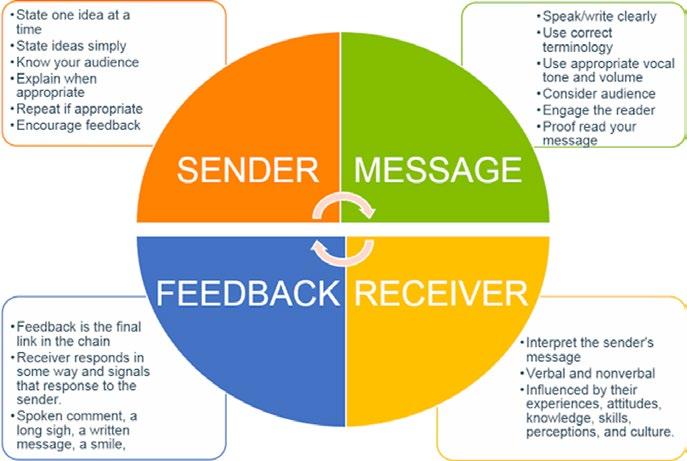
10 minute read
Women in Maritime
from Wavelength #80
•Face the speaker. •Do not be distracted by your thoughts, feelings or biases. •Do not mentally prepare a reply. •Avoid distraction from other things (for example, background activity and noise or your mobile phone). •Pay attention to the speaker’s non-verbal cues (for example, their body language, tone and volume of their speech) to pick up hidden meaning. 2. Show that you are listening.
•Combine eye contact with smiles to encourage the speaker. •Keep your posture open and interested – so try not to cross your arms or legs. •Try not to distract the speaker by playing with your mobile phone, fidgeting, looking at a clock or watch etc. 3. Give feedback.
Advertisement
•Reflect on what is said and the non-verbal cues. •Ask questions. •Summarize the speaker’s comments. 4. Keep an open mind.
•Try to think about the situation from the speaker’s perspective. •Allow the speaker to finish each point before asking questions. •Avoid jumping to conclusions. •Avoid interrupting with counter arguments. •Be open and honest in your response. •Give your opinions respectfully. •Don’t offer opinions or solutions unless asked to do so. •Treat the other person in a way that you think they would want to be treated. Effective communication is always about understanding the other person, not about winning an argument or forcing your opinions on others. Studies have proven that your overall happiness, career and life success, and income improve when you are an effective communicator.
Source: https://media.healthdirect.org.au/publications/CarerGateway_Resource_02_ Effective_communication_techniques_v03.pdf
Following a resolution being adopted by the IMO, 18th May has been made the International Day for Women in Maritime. In this first year of celebrating women in maritime, two of the main goals set by the IMO are the creation of a barrier-free working environment and the recruitment of more women into the industry to address the current gender imbalance. They are goals that will inevitably benefit everyone as even now, when they constitute a minority of the maritime workforce, women have played an integral role in numerous maritime activities. The inaugural International Day for Women in Maritime has arrived more than three decades after the IMO’s gender programme was initiated in 1988. Back then, maritime training institutes were not readily accessible to female students, but this has changed. Nowadays, thanks to IMO policies and procedures, training and employment opportunities for women in the maritime sector have become much more widespread. One way of gauging the success of such policies, procedures and opportunities is through numerical evidence. BIMCO and ICS report published in 2020 revealed that just 1.2% of seafarers are women. While this figure may be viewed as disappointing, it does represent a rise of almost 50% on 2015 figures. As regards shoreside staff, women are much more strongly represented. Indeed, in some sectors such as the cruise industry, crewing agencies and insurance women sometime outnumber their male colleagues.

Source: www.imo.org
With regard to the success of creating a barrier-free working environment, an IMO and WISTA survey showed that women are still vastly underrepresented in higher level positions. Although this finding is far from ideal, it appears that the Women’s International Shipping and Trading Association’s efforts to support the advancement of women into leadership roles are paying off. Since 2015 a number of women have helped to remove the glass ceiling, thereby paving the way for others to enhance their career prospects. Some of these trailblazers are listed below.
- Kathy Metcalf, President and CEO of the Chamber of Shipping of America, Chair of the ICS Environment SubCommittee (2015) - Captain Kate McCue, the first American woman to captain a cruise ship (2015) - Pailette Paleologou, VP, Hellenic, Black Sea and Adriatic Zone Bureau Veritas Hellas A.E. (January 2017) - Karrie Trauth, Senior VP, Shell Shipping and Maritime (August 2021) - Carol Howle, Executive VP, BP Trading and Shipping (2022) - Captain Amy Bauernschmidt, Commanding Officer of the USS Abraham Lincoln, the first woman to lead a nuclear aircraft carrier (January 2022) - Melina Travlos, the first female head of the Union of Greek Shipowners in its 106-year history (February 2022) - Dorothea Ioannou, CEO of the American P&I Club Managers (March 2022)
It may be tentatively concluded that the move towards the advancement of women in maritime into leadership roles is gaining momentum. This is a positive indication that barriers are being removed and that career paths in the industry are no longer solely determined by gender. It is a step towards a time when the degree of media coverage relating to women in maritime will be based purely on their achievements and recognition rather than on their gender. Of course, striving to remove gender bias within maritime is nothing new. A decade before the IMO’s gender programme began, a trailblazing female ship owner, headed a shipping company in a male dominated sector. We often refer to the founding fathers of nations or industries or clans. However, modern Greek shipping owes a lot to a founding mother: Athena (Nounou) Martinou. No tribute to women in the maritime industry would be complete without mentioning this living legend. Ms. Martinou set out independently from her family business in the late 1960s with a couple of ships. In the 1970s she was gradually joined by her three sons and their company, Thenamaris, grew steadily through the acquisition of secondhand vessels and new-buildings, and managing a diversified fleet. Apart from her undisputed business success, Ms. Martinou is noted for the favourable environment she has created among personnel and peers for novel ideas, enterprise and initiative. A significant number of Greek shipowners (presently controlling perhaps over 350 ships) can attribute directly or indirectly their involvement with this business to her, either having worked for her company, or having been assisted, guided, or inspired by her. Thenamaris and the other shipping companies that have emerged from the family presently control in excess of 250 large cargo vessels of all types, ensuring that the legacy of Nounou Martinou will be carried onwards by the next generations, both in way of the shipping industry, and her extensive philanthropic and charity work.
Athena (Nounou) Martinou Communication is also key to integrating women into maritime and furthering their careers. An event recalled by Carla Chamorro, a Rightship Vetting & Dry Cargo Inspections Superintendent, illustrates just how important it is. She described how certain crew members were shunning her. She assumed she had offended them in some way, so she sought answers from one of the crew. She discovered that in the belief system of the crew in question, talking to women outside their family without express permission was a sign of disrespect. Indeed, they believed that not talking to her was a display of deference. The explanation led to the elimination of any misunderstanding, and by sharing the experience, Carla Chamorro has made other women in maritime aware of such potential pitfalls.
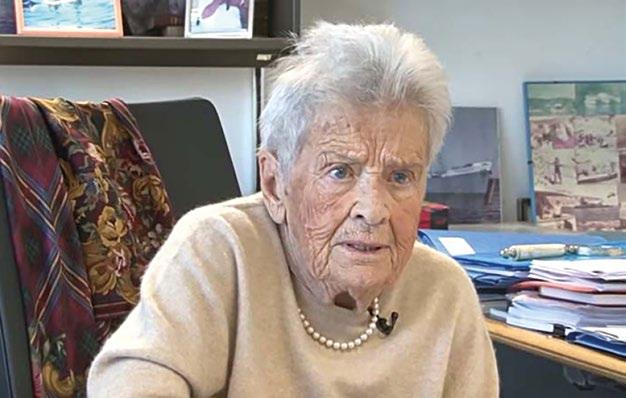
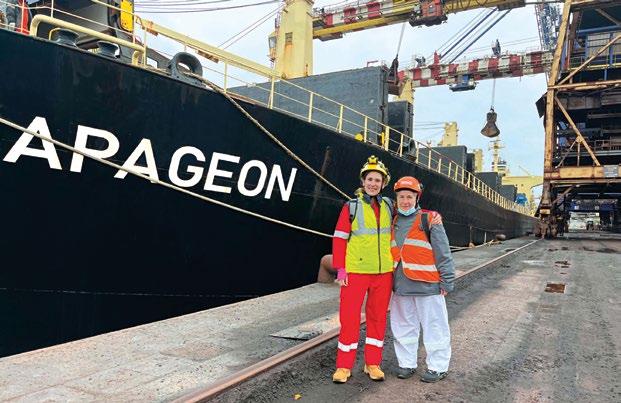
Carla Chamorro (left) - Rightship Vetting & Dry Cargo Inspections Superintendent, and Romina Perrone (right), during the inspection of the APAGEON in April 2022. Source: www.rightship.com Currently, organisations within maritime have a solid grasp of how women can move forward into and in the industry. Their career prospects are better than ever, and hopefully, this will result in more women adding to a much-needed diversity dimension among the seafaring workforce and staff in leadership positions. In the spirit of the IMO’s International Day for Women in Maritime, the Company would like to acknowledge the invaluable contributions made by senior female shore staff, and gain an insight into their perspectives on a career in the industry. Here are some of their reflections, observations and experiences relating to their time in shipping.
Despite hailing from another seafaring nation, I had very little prior knowledge of the maritime industry when I joined the company in 1991. I have not regretted it ever since as they were exciting years with lots of challenges, opportunities and changes. With respect to the role of women in Maritime, I am proud to say that we, as a company, have always had our fair share of women across the departments in roles ranging from Spares Purchaser to Accountant and from Bunker Purchaser to Chartering Broker. Over the years, more and more highly educated women have joined the company taking up important posts such as that of DPA, departmental Coordinator and ICT Specialist. The difference with 30 years ago is that we now also count among our staff female Technical Superintendents and Operators, positions that were traditionally male-dominated. Dedicating a day to Women in Maritime, however, could give one the impression that it is not as common as we wish to believe. Of course, there is always room for improvement but that applies to all sectors of the economy. Personally, I believe that the Maritime industry with its international approach and outlook continues to have a great future ahead with people at sea and ashore who love what they do, appreciate each other’s work and respect one another regardless of gender, nationality, religious, social or cultural background. In the end it is up to each and every one of us to make a difference.
Marianna Doumouliaka - Bunkers Purchasing Officer
“I have been working in this company for over 27 years now, starting off as a school leaver in the Chartering department as a secretary, and then on to an assistant in the Bunkers purchasing department. I found this role very interesting and I have now moved on and am now responsible for bunker purchasing for half the fleet reporting directly to my immediate superiors and top Management. What initially motivated me to join a shipping company was that I love the sea and that my father was a seafarer and he always recalled many of his stories at sea when I was a child. My brother also followed in his footsteps as a serving seafarer (Officer). I am very happy to be working in an international environment and meeting people from all over the world where we face daily commercial challenges, so no two days are ever the same.”

Christina Toki - Site Manager, Samsung Heavy Industries, Korea Natassa Sakellariou - Site Supervisor, Samsung Heavy Industries, Korea
“On the occasion of the International Day for Women in Maritime which was inaugurated this year by IMO, we would like to share some thoughts from the side of two marine engineers working in the technical department, attending vessels and supervising newbuilding projects as the owner's representatives. Nowadays, female representation in maritime still has a way to go in order to achieve a gender balanced working community, especially in stereotypically male positions like marine engineers, seafarers of all ranks, project leaders, surveyors, managers of shipping companies or other maritime organizations and, in general, in positions of leadership and decision making.
In addition, for women already working in the maritime sector prejudice, distrust and unequal treatment are sometimes still present. Thus, while a gender diverse workplace is a main goal, a parallel effort should be made in order for discrimination and biased behavior to be eliminated. And if all competent and motivated women can one day get the job they deserve in maritime or any other sector, we should never forget those women who do not have the fundamental human rights to education, freedom of expression and self-determination to manage their own lives.”
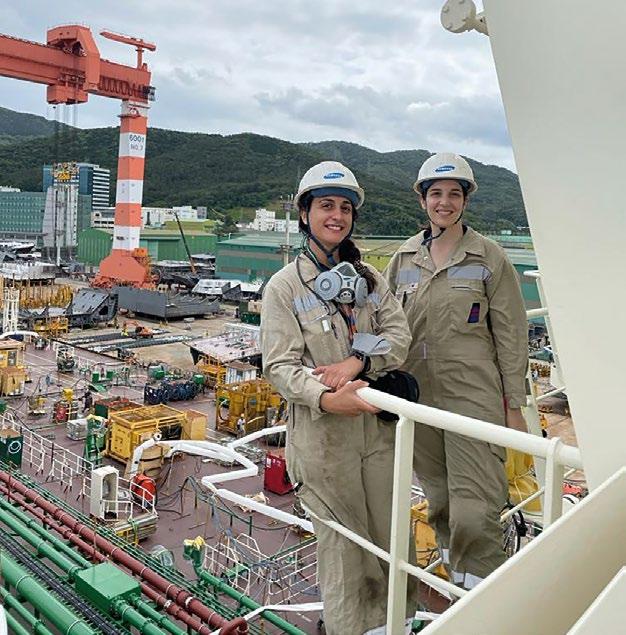
Johanna Durana - CENMAR Manila Acting General Manager
“I was initially hired as Documentation Officer when CENMAR was established in Manila back in 1996, and am now Acting General Manager. Since the pandemic I have been monitoring the daily operation of the office, including all crew changes of the Filipino crew with the guidance from the Principal’s Crew Dept. The most challenging aspect of my job is managing the staff and crew so that we can meet the timeline set by our Principals for crew changes. What I find most interesting being in the Maritime Industry is that it allows me to work in a job that is constantly changing because of the people in it—the shore based staff and onboard crew.”
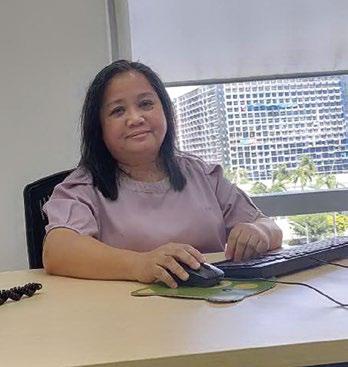
Sources: www.cdn.imo.org, www.seatrade-maritime.com, www.wistainternational.com www.reviewjournal.com, www.imo.org, www.thedenverchannel.com, www.ics-shipping.org www.bp.com, www.bluesky-maritime.org, www.rightship.com, www.allaboutshipping.co.uk








